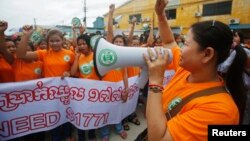The Cambodian government has announced it would hold a new round of minimum wage talks for garment workers starting in September.
The government has organized annual minimum wage negotiations between factory owners, industry representatives and unions since violent garment worker strikes led to the killing of at least five people by the security forces in early 2014.
“All relevant parties must use social assessment (family condition, inflation, and daily expenses) and economic assessment (productivity, competitiveness of the country, employment situation and the level of income of the industry) as well as poverty line to be the basis for discussing minimum in Cambodia,” read a statement from the government.
Yang Sophoan, president of the Cambodian Alliance of Trade Unions, said despite several wage increases since the strikes of 2013 and 2014, union representation was still weak compared with the power of the garment companies.
“There are not many unions that have tried to protect workers' voices and figures that were submitted for the talks,” she said, adding that unions who championed the rights of workers had routinely been marginalized by the government
“If we don't have one voice, our voices will be ignored. So, how can we win votes if they base decisions on the arguments of the employers. The government normally never votes in favor of voices supporting workers,” she said.
Ath Thorn, president of the Cambodian Labor Confederation, agreed, noting that a new trade union law and the targeting of independent union leaders by the courts had put pressure on workers’ representatives.
“There are many cases in the courts, including me. I have seven or eight criminal complaints at the court, which is pressure on us,” he said.
The overwhelming victory of the ruling Cambodian People’s Party in last month’s election in the absence of the country’s main opposition party would also introduce added pressure on unions during the negotiations, he said.
Last year, in a bid to curry favor with the more than 700,000 garment workers in the country ahead of the election, Hun Sen oversaw the raising of the minimum wage to $170 per month and provided additional benefits such as free transportation and medical care.
He also ordered the establishment of health centers near garment factories for easy access to medical treatment.
Both Sophoan and Thorn said workers would need a significant increase in their monthly wage in order for their income to keep pace with rapid inflation in recent years.
Heng Sour, labor spokesman, could not be reached for comment.
Ken Loo, secretary general of the Garment Manufacturers Association in Cambodia (GMAC), the main garment industry body in Cambodia, declined to comment on a figure that would be acceptable to factory owners.
“We are facing daily competition, meaning we just want the union side to consider the ability [of the employers] before they demand,” he said. “They need to let us have space for competition. If the wages rise too high, they would stop ordering from us.”








